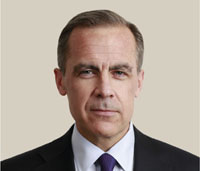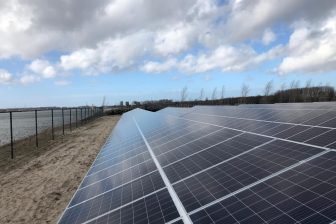
’20-30% van olie, gas en kolen moet in de grond blijven’
1 oktober 2015 – Mark Carney van de Bank of England trekt aan de bel over de enorme financiële risico’s door de klimaatverandering. Veel ‘geld’ zal in de grond moeten blijven zitten.
De Volkskrant schrijft over een speech die Carney hield op uitnodiging van verzekeraar Lloyds. De kernboodschap van Carney is dat de wereld vanwege de langetermijngevaren rond het klimaat nú in actie moet komen.
Uit het bericht van de Volkskrant
‘(…) Wie de wetenschappelijke inzichten over klimaatverandering serieus neemt, moet volgens hem erkennen dat eenderde tot eenvijfde van de olie-, gas- en kolenvoorraden in de grond moeten blijven. (…) Hij is de eerste bankpresident die klimaatverandering als een direct gevaar betitelt voor de stabiliteit van de financiële wereld. ‘Op de lange termijn is dit een van de belangrijkste risico’s’, zei hij in een toelichting tegen de BBC. ‘Maar tegen die tijd kan het te laat zijn om maatregelen te nemen. Nu kan dat nog wel.’ (…) ‘Groen financieren kan op de middellange termijn geen nichemarkt meer zijn.’ (…)’
Uit een bericht van The Guardian
‘(…) Mark Carney, the governor of the Bank of England, has warned that climate change will lead to financial crises and falling living standards unless the world’s leading countries do more to ensure that their companies come clean about their current and future carbon emissions. (…)’
En juist omdat Carney heel nuchter en zakelijk de financiële belangen op een rij, is zijn waarschuwing erg indringend.
 ‘Eenvijfde tot eenderde van de bewezen reserves moet in de grond blijven’
‘Eenvijfde tot eenderde van de bewezen reserves moet in de grond blijven’
Uit de lezing van Carney
‘(…) Risks to financial stability will be minimised if the transition begins early and follows a predictable path, thereby helping the market anticipate the transition to a 2 degree world. (…)
The IPCC’s estimate of a carbon budget that would likely limit global temperature rises to 2 degrees above pre-industrial levels. That budget amounts to between 1/5th and 1/3rd world’s proven reserves of oil, gas and coal. If that estimate is even approximately correct it would render the vast majority of reserves “stranded” – oil, gas and coal that will be literally unburnable without expensive carbon capture technology, which itself alters fossil fuel economics. The exposure of UK investors, including insurance companies, to these shifts is potentially huge. (…)
Financing the de-carbonisation of our economy is a major opportunity for insurers as long-term investors. It implies a sweeping reallocation of resources and a technological revolution, with investment in long-term infrastructure assets at roughly quadruple the present rate. For this to happen, “green” finance cannot conceivably remain a niche interest over the medium term. There are a number of factors which could influence the speed of transition to a low carbon economy including public policy, technology, investor preferences and physical events. From a regulator’s perspective the point is not that a reassessment of values is inherently unwelcome. It is not. Capital should be allocated to reflect fundamentals, including externalities. But a wholesale reassessment of prospects, especially if it were to occur suddenly, could potentially destabilise markets, spark a pro-cyclical crystallisation of losses and a persistent tightening of financial conditions. In other words, an abrupt resolution of the tragedy of horizons is in itself a financial stability risk. The more we invest with foresight; the less we will regret in hindsight. (…)’
Climate Disclosure Taskforce
Omdat politiek, bedrijven en instellingen nauwelijks in termen van de lange termijn kunnen denken, pleit Carney voor een Climate Disclosure Task Force.
‘(…) The logical starting point is a co-ordinated assessment of what constitutes effective disclosure, by those who understand what is valuable and feasible. One idea is to establish an industry-led group, a Climate Disclosure Task Force, to design and deliver a voluntary standard for disclosure by those companies that produce or emit carbon. Companies would disclose not only what they are emitting today, but how they plan their transition to the net-zero world of the future. The G20 – whose member states account for around 85% of global emissions – has a unique ability to make this possible. (…)
Our societies face a series of profound environmental and social challenges. The combination of the weight of scientific evidence and the dynamics of the financial system suggest that, in the fullness of time, climate change will threaten financial resilience and longer-term prosperity. While there is still time to act, the window of opportunity is finite and shrinking. Others will need to learn from Lloyd’s example in combining data, technology and expert judgment to measure and manage risks.(…)
Klimaattop Parijs
The December meetings in Paris will work towards plans to curb carbon emissions and encourage the funding of new technologies. We will need the market to work alongside in order to maximise their impact. With better information as a foundation, we can build a virtuous circle of better understanding of tomorrow’s risks, better pricing for investors, better decisions by policymakers, and a smoother transition to a lower-carbon economy. (…)’
Bronnen
De Volkskrant, 1 oktober 2015: ‘Klimaatverandering kan leiden tot financiële chaos’ (via Blendle)
The Guardian, 29 september 2015: Carney warns of risks from climate change ’tragedy of the horizon’
Bank of England, tekst van de speech, 29 september 2015: Breaking the tragedy of the horizon – climate change and financial stability – speech by Mark Carney
Video volledige speech bij RTL Z, 30 september 2015: Baas van Bank of England: Klimaatverandering bedreigt financiële stabiliteit (25′)



